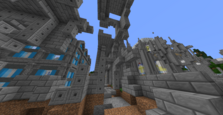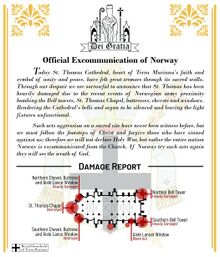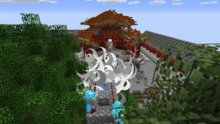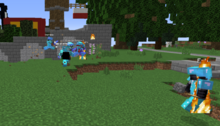The Second Great Server War: Difference between revisions
>Barvaux-Condroz (Major additions) |
>Barvaux-Condroz (Major additions) |
(No difference)
| |
Revision as of 08:44, 15 December 2019
The Second Great Server War or the Second Great War is a war that has gone on since September 8th, 2019. The war was started by Norway.Template:Battle/War TemplateThe war is a ten-sided war, but these sides are grouped into two groups: Pro-Norwegian Powers and the Allied Powers. It is one of the biggest wars on EarthMC. Throughout the course of the war many nations joined, rejoined, and switched sides, leading to a confusing tangle of alliances. The war was initially known as the Norwegian Conflict and referred only to what is now known as the Seven Day's War; however, after the Great Resumption it soon grew to encompass most nations in EarthMC and thus was renamed to the Second Great Server War.
Background
Needs more info
The Seven Days' War
Beginning
On September 8th 2019, Norway and their ally Qin declared war on the Global Powers and Kalmar Union, consisting of Turkey, Terra Mariana, Bosnia, Czechoslovakia, Iceland, Godthab, Namibia, and Patagonia.
Needs more info
Black Saturday
A week later on September 14th 2019, a sortie of Norwegian forces carried out an attack on the capital of Terra Mariana, Arensburg. Using TNT, the attackers destroyed the southern wall of the city as well as much of the famous and server-renowned St. Thomas Cathedral. In response to the incident, Terra Mariana released a statement condemning the Norwegian attack and officially excommunicating Norway from the Church.
After Black Saturday, many nations joined the cause against Norway including the USA, Canadian Union, Scotland, Algeria, Lithuania, Japan, Monaco, Uruguay, and Djibouti.
White Sunday
The following day, the Greater Reich announced plans to coordinate with Uesugi, the Triumvirate, and the Canadian Union in a mutual defense pact against Norway, and soon after the UN declared war on Norway as well.
However, not long after this the Canadian Union pulled out of the agreement and left the war entirely, and Uesugi and Norway agreed on a peace treaty. The remaining members of the Anti-Norwegian powers also began to work on establishing peace with Norway.
While talks were occurring, a skirmish took place outside of Volgograd, but little happened to either side. By the end of the day, Norway, Qin, and Yue had signed a white peace agreement with the Global Powers, Canadian Union, Uesugi, and the UAS [sic]. Despite the official white peace, Norway saw the agreement as a victory as they claimed to have gained over 40 sets of god armor within combat compared to a loss of around 10. The Anti-Norwegian coalition, however, denied this claim and emphasized Norway's avoidance of combat in their civilian bombings. Despite these minor arguments, however, the conflict had officially concluded, and only seven days from the initial declaration of war, leading to the moniker "Seven Days' War".
The Great Resumption
The War Resumes
On September 23rd 2019, just 8 days after peace had been reached, the Norwegians broke their previous treaties and declared war against Uesugi and the Canadian Union. This time, Norway was backed by the alliance that would come to be known as the Regional Powers. The Regional Powers consisted of Norway's allies from the Seven Days' War- Qin and Yue- as well as the nation of Britain.
Soon after Norway's declaration of war, the Greater Reich, which had previously tried to coordinate with Uesugi and the Triumvirate against Norway, declared war against Uesugi; however, they maintained that they were only at war with Uesugi and had not sided with Norway in their conflict. Following these declarations, the members of the Entente mobilized and declared war against Norway. In response to the Entente's declaration of war, Weston and Rio Grande declared war on Uesugi, the Canadian Union, and the Entente.
The following day, Poland declared war on Norway as well, and Colombia left the Entente. A day later on September 25th, Colombia would also declare war on the Entente.
On September 28th, the citizens of the Kalmar Union, which had previously been at war with Norway during the Seven Day's War, voted to dissolve their constitutional monarchy entirely and reform the government into a constitutional republic. Norway, which was a monarchy itself, saw the possibility of a reform movement spreading into their nation as a potential threat and released a strong pro-monarchy statement. The proclamation attacked the efficiency of democratic systems and criticized the Kalmar Union for their constant insults and jabs towards the Norwegian monarchy, warning them that "speaking is different than that of actions". The same day, Cuba would join the side of Norway against Uesugi, the Entente, and the Canadian Union.
The Fengtian Bombings
On September 29th, a Norwegian-led force undertook a series of bombings aimed at Fengtian, the capital of Qing (a member of the Entente). Using rudimentary TNT cannons, the assailants launched TNT from the edge of claims into the heart of the city. The bombings, which were heavily reminiscent of the Black Saturday bombings, left a large portion of the city's main pagoda damaged and was one of the first major offensives of the newly resumed war.
"Red" October
On October 5th, the United Nations of America, which had formed on October 1st, renamed itself to the North Atlantic Treaty Organisation, or NATO, and joined the war on Norway's side. NATO consisted of several nations which were already involved in the conflict, including Cuba, Rio Grande, Weston, and Colombia, however many new nations joined the war, such as Florida, Hudson Bay, Mexico, New Mexico, Dutch-Indies, Bermuda Triangle, and Patagonia, the latter of which had previously been involved in the Seven Day's war but on the side against Norway. New England, New Jersey, and New York had on October 3rd formed the Northeastern States of America, and despite all three being a part of NATO, remained neutral in the conflict.
In response to NATO's declaration of war, the Entente also declared war on NATO. The nation of Hawaii then joined the side of the Anti-Norwegian powers and declared war on Norway. Consecutively, the nation of Niger, well known for their focus on PVP, joined the Regional Powers and declared war on the Entente, Canadian Union, and the other Anti-Norwegian powers.
A day later on October 6th, Polish and British forces met outside Gdansk in a small altercation that would become known as the Battle of Gdansk. There were a few casualties on both sides, with the final death being Snowwy_b, who died after fighting in a 1v1 against the King of Norway _Alexandre.
On October 7th, the Greater Reich reached a peace agreement with Uesugi and withdrew from the war. However at the same time, they declared war on New York, a part of NATO, in order to support Virginia, which was at war with New York. The same day, Rio Grande and Turkey formally joined the Alliance of Regional Powers.
Canada Surrenders
On October 9th, the Canadian Union surrendered to the Norwegian Powers
Pro-Norwegian
The Regional Powers
Norway
Britain
Niger
Sui
Yue
Qin
Imperial Japan
Pro-Norwegian
German Empire
Turkey
Cuba
Rio Grande Empire
Rio Grande
Sinaloa
Mexico
New Mexico
NorthRio
Colombia
Malawi - neutral
Jamaica
Weston
South Africa
───────────────────
Allied Powers
The House of Uesugi
California
Demak
Guyana
Han
Hong Kong
Liao
Micronesia
Mughal Empire
Nenets
Russia
Western Siberia
Siberia
Tibet
The Entente
Deutschland
Livonian Order
Poland
Caer
Jamaica
Samoa
New Spain
Patagonia
TDF
Congo
Glacial Empire
Far East
Allied Powers
The Philippines
Hawaii
Deseret
Triumvirate
French Empire
France
Netherlands
Savoy
Southpole
Greater Roman Empire
Byzantium
Illyria
Italia
Bulgaria
Romania
Aegyptus
Numidia
Persia
Greater Armenia
Georgia
Spanish Empire
Spain
New Spain
Costa Rica
Hispaniola
Spanish Uruguay
Spanish Sahara
Portugal
African Powers
Nubia
Malawi




